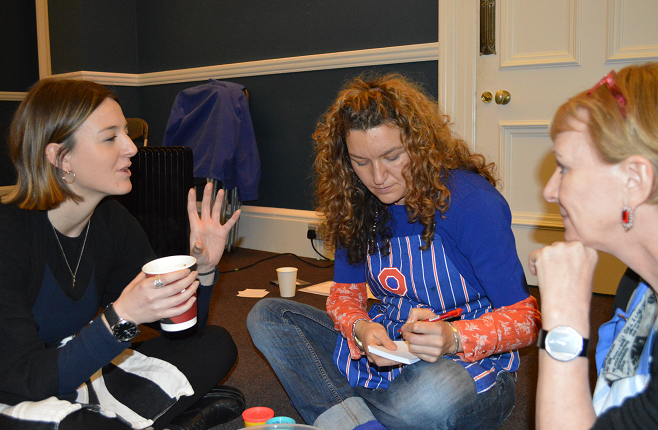Transitions in Later Life learning community: March 2018

Disrupting Ageism
What do you think of when you hear the word ‘ageing’? For most of us the answer is later life.
Dave and Hannah from the Centre for Policy on Ageing began day one by donning a ‘creative disruptive persona’ and asking questions about ageing, to introduce a discussion on ageism in society. The group were encouraged to ask questions like ‘how are you ageing today?’ to colleagues, family and friends in the run up to the session. This proved to be a useful exercise. Particularly, discussing ageing with people who don’t work in this sector provided a new perspective; even a five-minute conversation could give great food for thought.
Language
Next, we discussed ageist language. We know that language in the media and beauty industry can be particularly painful – e.g. ‘anti-ageing’ creams – but we must also be careful with the language we use in our work. We discovered that we all liked and disliked different terms associated with older people and later life. We felt it could be helpful to have a similar discussion with course participants.
Positive transitions
Following this, the group designed rituals which ‘aim to be affirmative and positive transitions, rites of passage fit for our aspirations for people who have participated and “graduated” from our various courses.’ Suggestions from this creative session included a celebration of what has been achieved and what is to come; and something to signify passing through a transition – such as a gate or archway.
Project updates
The group discussed the importance of developing relationships with key individuals within partner organisations, including employers. These relationships are often with champions who really understand the work and can provide an ‘in’, or where there has been continued contact over time with key individuals. However, there is a danger that these relationships will be lost when members of staff move on or change role.
Encouragingly, members of the learning community identified that there is often strong demand for this work from course participants, and great demand for the ‘train the trainer’ model.
Consultations
On day two, we met with the Royal Society for Public Health, which is conducting research with the Calouste Gulbenkian Foundation on ageism, for a report titled ‘That Age Old Question’. The cohort provided helpful feedback on the report’s draft recommendations. Read the report.
The Centre for Ageing Better also consulted the learning community on the topics of retirement and managing change. The input will help inform an upcoming book that will cover a range of issues facing people as they grow older, and provide advice for people to prepare for these transitions.
Problem solving
The group took part in a problem solving session to talk about challenges in their work, share insights and offer solutions.
Next steps for the learning community
At the end of a busy two days, the group discussed their ambition to hold an externally-facing event or series of themed roundtables in 2018 – potentially on routes to market.
